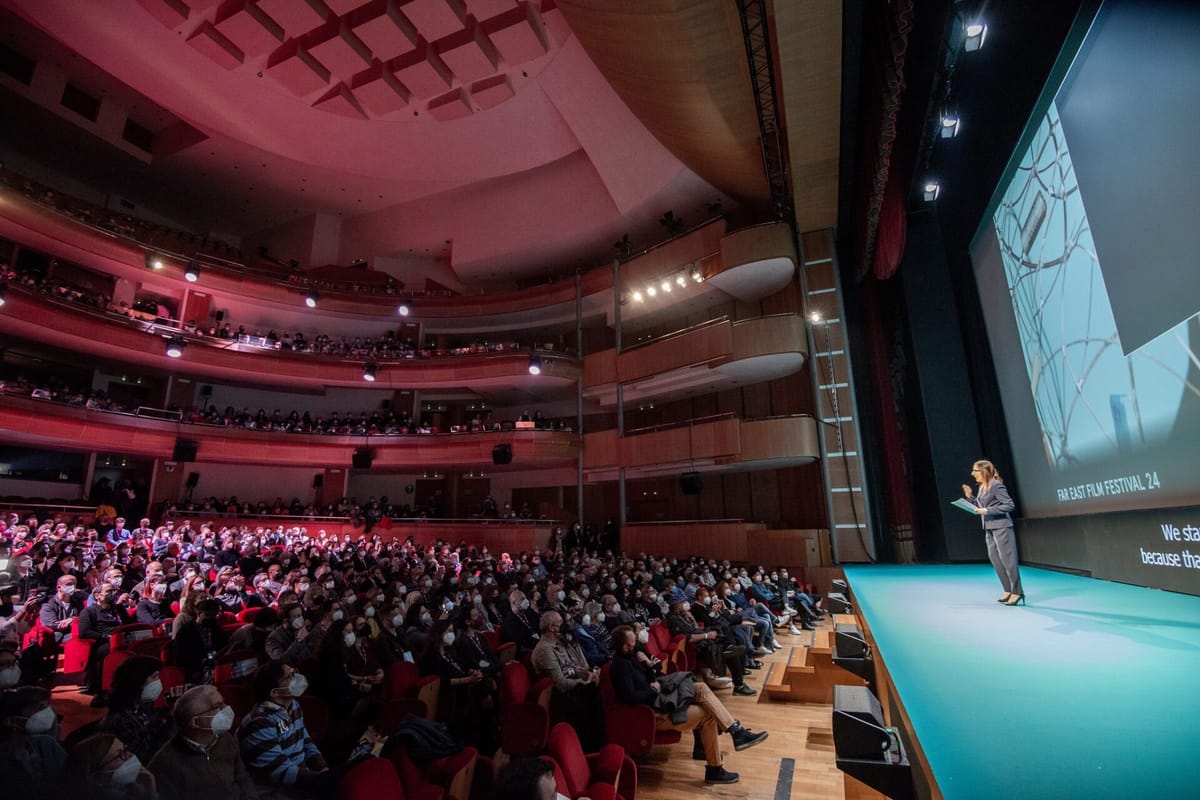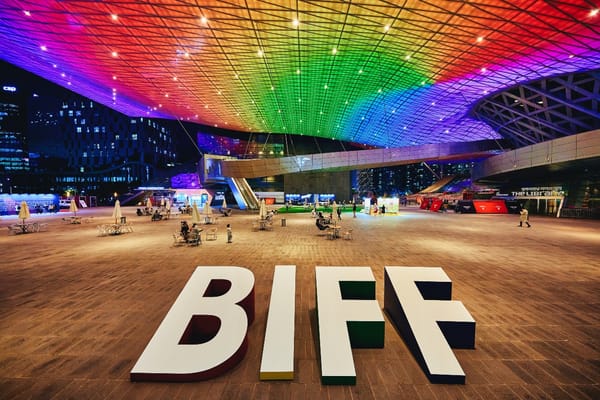Will Asia’s Distribution Landscape Ever Return To Normal?

And what was normal anyway? These were some of the big questions being debated at Focus Asia, the industry platform of Far East Film Festival (FEFF, April 22-30) in Udine, Italy, which has turned out to be one of the first major in-person interactions between the Asian and European film industries during the pandemic. Also this week, speculation over China easing its clampdown on its local tech industries; James Murdoch and Uday Shankar’s Bodhi Tree Systems pumps $1.78bn into India’s Viacom18; an Arizona-based private equity firm buys STX Entertainment; and Amazon Prime Video announces a bumper slate of originals and a TVOD service for India.
FOCUS ASIA: Asia’s theatrical markets and selling to the streamers
While CinemaCon participants were having their minds blown in Las Vegas by impending big screen extravaganzas including Jurassic World: Dominion and Avatar 2: The Way Of Water, film industry folk from Asia and Europe were in Italy debating the realities of the post-pandemic theatrical landscape (not that we’re truly ‘post’ anything, but let’s try to stay positive). On a panel entitled ‘Asian film distribution: Post-pandemic, Pre-what?’, moderated by Variety Asia Editor Patrick Frater, four sales agents and producers discussed whether Asia’s theatrical market will ever rebound back to pre-pandemic levels, and whether selling to the streamers will ever make up the shortfall if not.
As the northern hemisphere heads into spring and learns to live with Covid, most Asian territories are slowly reopening their borders and their cinemas, with the notable exception of China. But producer and former sales agent Michael Werner said there’s still a huge amount of uncertainty, although it’s clear that audience habits have changed: “People are not as inclined to go to the theatre as they used to be,” said Werner, who is a long-time Hong Kong resident. “In Hong Kong, in particular, if young people are going to the cinema, it’s for a Marvel or superhero or genre film, but everything’s changed and it’s not clear it’s coming back in the way it once was.”
XYZ Films acquisitions chief Todd Brown said he believes the market will rebound, although more slowly than anticipated, and noted that in pre-Covid times, films would sell to Asia as a block “for equivalent or larger than Europe”. But after two years of Covid, the landscape has become much more fragmented: “China is very much its own thing. Then you have territories like Indonesia or Vietnam that had explosive growth in the theatrical market, which was on hold during the pandemic, then certain other territories that are just either holding to a very conservative approach to releasing, or kind of stuck in not having infrastructure. What the pandemic has done is really shown up a lot of the fracture lines within all these different systems.”
And now the fracture lines are turning into canyons. One of Hong Kong’s major exhibitors, UA Cinemas, folded during the pandemic; Singapore’s mm2 had to sell Cathay Cineplexes at a loss; Malaysia’s MBO went out of business; and two of India’s biggest chains, PVR and Inox, merged because it wasn’t viable to keep competing.
Arthouse cinema looks like the first obvious casualty at the distribution level, as the theatrical space, especially in Asia, was always small and is shrinking even further. Silvia Simonutti, of Paris-based sales agent Wild Bunch, said the company survived through the pandemic by selling its back catalogue, mostly to streamers, and focusing on discovering new talent. But distributors have become much more selective: “They always ask, is the film English-speaking? If not, what is the cast? Is the director well known? Will the movie be selected in a major festival? They need something stronger, and if you can’t offer that, it’s very difficult.” She added that for certain films it’s very easy – buyers are lining up for films from Studio Ghibli and Hirokazu Kore-eda – but most other titles require a lot of work.
China is currently the Asian market most affected by the pandemic, with half its cinemas closed and box office averaging just over $1m a day for the entire country, as the government sticks to its zero Covid policy in battling Omicron, which is ironic as in 2020 it was also the first major territory to rebound from Covid-19. Cao Liuying of Chinese sales agent Parallax Films said she believes that, despite the difficulties faced by the arthouse sector, it is the narrow range of films in the market, not just the pandemic, that is keeping audiences away from cinemas. “The young audience is not as interested as in the past, simply because there is no diversity in the films,” Cao said. “There are still some players in terms of acquiring foreign titles in China, but the main distribution channel is not cinemas, it’s festivals and then streaming platforms. But while platforms are acquiring a relatively large amount of films, they’re not promoting them as hard as they should.”
Southeast Asia is often cited as a collection of theatrical markets that could one day compensate for the loss of China, but the speakers noted that infrastructure is still very basic in many of these territories. Indonesia, for example, does not have many dedicated distributors, so most films are sold by producers directly to the cinemas. Pre-pandemic, box office was shooting up in markets like Vietnam and Indonesia, as screen count increased due to investment by mostly Korean exhibitors. But all these markets have relatively low spending power and mobile penetration is increasing rapidly, which means streaming platforms could end up being the major distribution channel for films.

The panel also debated how the collapse in theatrical revenue is affecting producers. In Korea, one of the few markets with reliable box office figures, local films grossed $776m in the pre-pandemic year of 2019, but that figure fell to $280m in 2020 and further to $140m in 2021. However, Brown noted that Korea’s biggest players are highly diversified and may have actually benefitted during this period: “They’ve clearly been looking at this as a distressed market where they can start accumulating more assets for when the rebound happens. So CJ ENM bought Endeavor and [JTBC Studios] bought Wiip. These companies clearly still had some juice in the pocket.” In other words, as in so many other areas of the industry, the market is becoming increasingly polarised between big players with resources, and the tiny outfits with low overhead, with the middle ground subsiding in between.
As for selling to the streamers, Simonutti and Cao both said that selling back catalogue either to Netflix or Chinese streamers provided much needed cash flow during the pandemic, but Werner observed that this revenue stream is open to a lot of “collateral damage” as the business plans and strategies of most players are constantly in flux. Brown said it’s already noticeable that Netflix is buying less since it announced that its subscriber numbers had dropped and its share price tanked last week. Cao added that “the VOD audience in China would prefer watching reality shows or TV series, so there’s very limited room for independent films.”
The panel concluded by saying that all this uncertainty and rapid change means that all eyes will be on the sales business at the Cannes Marche next month. Simonutti said she’s very much hoping to be able to meet Asian buyers in person in Cannes, because while online markets have kept relationships going with existing clients, it’s difficult to build new relationships and everyone has reached peak Zoom fatigue. Werner concluded: “We all want to be optimistic, you know as humans, it’s all about hope. But it’s still just a very unclear and unpredictable environment.”
- Speaking of hope, as Streamlined was going to press, news broke in the Asian press that the Chinese government may be relaxing its clampdown on Chinese tech companies as a means to counteract the economic damage wrought by the latest Covid lockdowns. South China Morning Post reported that a symposium is meant to happen between the government and a group of tech giants, including Alibaba Group, Bytedance and Tencent Holdings, following the May Day holidays (May 1-5). Streamlined will be following events, so watch this space.
PRODUCTION NEWS:
- Hong Kong telco PCCW’s new entertainment subsidiary, MakerVille, announced that its first production will be murder mystery Seer, produced by Johnnie To and directed by Soi Cheang. Already in post-production, the film stars Lam Ka Tung and Lokman Yeung of popular boy band Mirror. Makerville CEO Lofai Lo, who formerly headed PCCW-owned Hong Kong broadcaster ViuTV, said the new subsidiary would be involved in producing content, artist management and events. PCCW also operates pan-regional streaming service Viu.
- Disney announced at CinemaCon that it has set a North America theatrical release date of September 9 for its upcoming Hindi-language epic, Brahmastra Part One: Shiva, directed by Ayan Mukerji (Yeh Jawaani Hai Deewani) and starring Ranbir Kapoor, Amitabh Bachchan and Alia Bhatt. The first part of a trilogy, the film is produced by Disney-owned Fox Star Studios, Karan Johar’s Dharma Productions, Prime Focus and Starlight Pictures. It will also release in India and other international territories on Sept 9.
- Variety had an exclusive on an adaptation of Chinese writer Tong Hua’s sci-fi fantasy novel series, The Memory Lost In Space, by Peter Luo’s Los Angeles-based Stars Collective, which is planning an English-language TV series and film, along with NFTs and other blockchain-related products.
CORPORATE:
- James Murdoch and Uday Shankar’s Bodhi Tree Systems is fundraising with a consortium of investors to invest $1.78bn in India’s Viacom18, which is jointly owned by Network 18, the media group controlled by billionaire Mukesh Ambani, and US conglomerate Paramount Global (formerly known as ViacomCBS). The consortium includes Ambani’s Reliance Industries, which is investing $216m in Viacom18 and transferring its streaming app JioCinema to the company. Viacom18 assets currently include broadcast channels, streaming service Voot, and content production and distribution studios. However, this new investment is likely prompted by the recent merger of rival Indian media group Zee Entertainment with Sony’s Indian arm, as the Indian media market undergoes consolidation, and long-established legacy media giants bolster their war chests, in response to the shift towards digital and streaming.
- Phoenix, Arizona-based private equity outfit, The Najafi Companies, has acquired STX Entertainment, which as expected is parting ways with India’s Eros International, following a turbulent merger that was first announced in early 2020. Eros will retain a 15% non-voting stake in STX and said it had fully repaid outstanding debts associated with the merger. Robert Simonds will now serve as STX chairman, with current president Noah Fogelson as CEO, and John Friedberg as head of international sales and acquisitions in London. Eros also said it is changing its name to Eros Media World following the demerger, with Rishika Lulla Singh as executive chair, Pradeep Dwivedi as CEO and Rajesh Chalke as CFO.
- Variety also had an exclusive on Korea’s CJ ENM continuing its acquisitions streak by buying a stake in US-based metaverse company Hyperreal Digital, which creates realistic 3D digital humans. That’s one way to deal with temperamental and liability-prone stars.
CANCELLED:
- The Philippines has followed Vietnam in halting all screenings of Sony action adventure Uncharted over a scene that shows a map of the South China Sea, including the disputed “nine-dash line” that marks territory claimed by China. The film has been on release in the Philippines since February 23. The appearance of the controversial nine-dash line also scuppered the 2019 release of DreamWorks animation Abominable in the Philippines, Vietnam and Malaysia.
CURATED:
- Cannes Film Festival finally announced its juries for Competition and Un Certain Regard (UCR). French actor Vincent Lindon will be president of this year’s Competition jury, which also includes UK/US actress and director Rebecca Hall, Indian actress Deepika Padukone, Swedish actress Noomi Rapace, Italian actress and director Jasmine Trinca, Iranian filmmaker Asghar Farhadi, French actor and filmmaker Ladj Ly, US director Jeff Nichols and Norwegian filmmaker Joachim Trier. The announcement was made much later than in previous years, leading to speculation that there had been some last minute rejigging, especially as Farhadi would have been an obvious choice of jury president, but is currently embroiled in a plagiarism case in the Iranian courts. Italian actress and director Valeria Golino will head the UCR jury, which also includes Polish actress Joanna Kulig, Venezuelan actor Édgar Ramírez, US director Debra Granik, and French singer-songwriter and actor Benjamin Biolay.
- Cannes also announced that French-Senegalese co-production Father & Soldier will premiere as the opening film of UCR. Starring Omar Sy, Alassane Diong and Jonas Bloquet, the film is the second feature directed by French filmmaker Mathieu Vadepied and tells the story of Senegalese infantry men who fought for France in World War One.
SOLD:
- Deadline had an exclusive on arthouse streamer and theatrical distributor Mubi acquiring Park Chan-wook’s Cannes-bound Decision To Leave for North America, UK, Ireland, Turkey and India. Korea’s CJ Entertainment is selling the film.
STREAMING UPDATES:
- Korea’s total paid SVOD subscriptions reached 14.1 million in the fourth quarter of 2021, according to a report from Media Partners Asia (MPA), with five platforms – Netflix, Disney+, Wavve, TVing and Coupang Play – together accounting for an 85% share of subscriptions and 83% of SVOD streaming minutes. The report also found that nearly 70% of premium video consumption in Korea is driven by Korean dramas, movies and variety shows, which are also reaching audiences outside of Korea, while US series and movies capture just 14%.
- Amazon Prime Video India unveiled a bumper crop of original series and films across multiple Indian languages at an event in Mumbai’s JW Marriott Sahar hotel, attended by Amazon top brass including Amazon Studios chief Jennifer Salke. Hindi-language scripted series include Adhura with Emmay Entertainment, Call Me Bae with Karan Johar’s Dharmatic Entertainment and four series from Excel Media, including Bambai Meri Jaan, Dahaad and new seasons of Made In Heaven and Mirzapur. Deadline has the full list of 40 productions here. Amazon has also launched a transactional video-on-demand (TVOD) service in India, Prime Video Store, which will offer early rental access to the latest Indian and international films.
- Earlier in the week, Amazon Prime Video India had separately announced the filmmakers involved in Modern Love Mumbai, the first of three Indian versions of the international anthology franchise inspired by a New York Times column, which is scheduled to start streaming globally from May 13, 2022. Produced by Pritish Nandy Communications, the film will include segments directed by Shonali Bose (entitled Raat Rani), Hansal Mehta (Baai), Vishal Bhardwaj (Mumbai Dragon), Alankrita Shrivastava (My Beautiful Wrinkles), Dhruv Sehgal (I Love Thane) and Nupur Asthana (Cutting Chai). Award-winning Singapore actress Yeo Yann Yann stars in Bhardwaj’s segment.
- Netflix is working with India’s Ministry of Information and Broadcasting on a series of short videos, entitled Azadi Ki Amrit Kahaniyan, celebrating extraordinary and inspiring individuals to mark 75 years of Indian independence. Narrated by Indian actress Neena Gupta, the videos focus on people like India’s first female firefighter, Harshini Kanheker; environmentalist Basanti Devi, and Anshu Jamsenpa, the first woman in the world to summit Mount Everest twice in five days.
- Netflix also announced a collaboration with Japanese animation producer Studio Colorido to produce three features, starting with Drifting Home, which is scheduled to stream from September 16. One of the other two projects will be directed by Tomotaka Shibayama and launch on Netflix in 2024. Netflix and Studio Colorido previously worked together on A Whisker Away, which premiered on the streamer in 2020 after its theatrical release was delayed by the pandemic.
OBITUARY:
- Hong Kong actor Kenneth Tsang was found dead on Wednesday at a hotel in Hong Kong where he was undergoing the city’s mandatory travel quarantine for Covid-19. The 86-year-old actor had tested negative for Covid the previous day. His career spans more than 50 years of Hong Kong cinema, starting with appearances in films such as The Feud (1955) and Who Isn’t Romantic? (1956), when he was a teenager, to playing leading roles in 1960s kung-fu and detective movies through to iconic 1980s films such as John Woo’s A Better Tomorrow (1986). His recent roles include legal drama The Attorney, released last year, and crime drama Man On The Edge, which is currently on release in China. He also appeared in Hollywood movies such as The Replacement Killers (1998), Rush Hour 2 and Die Another Day (2002).




